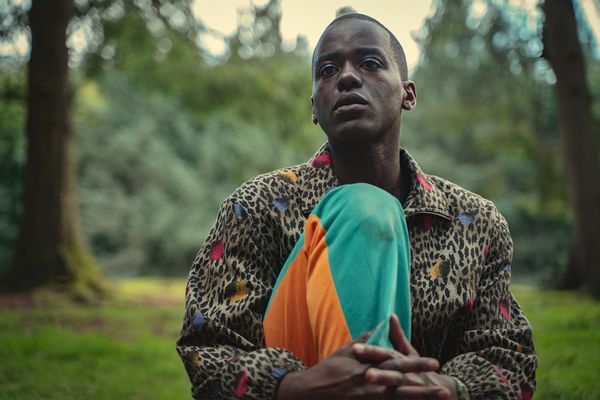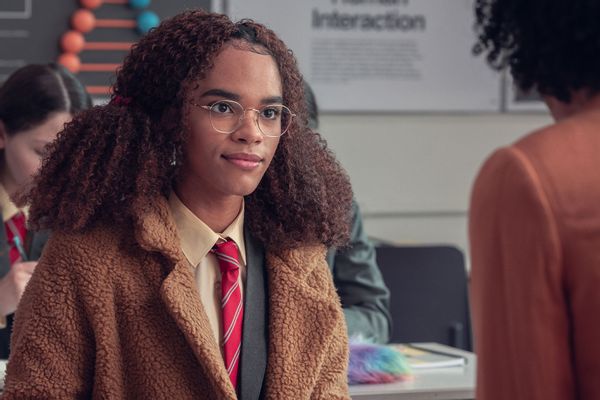
When "Doctor Who" producers revealed Jodie Whittaker to be the 13th incarnation of The Doctor in 2017, there was much rejoicing, although some of the show's fandom wasn't so pleased. Whittaker succeeded Peter Capaldi, and joined the franchise along with Chris Chibnall, who worked with her on "Broadchurch" and took the showrunning reins from Steven Moffat. Neither Whittaker nor Chibnall had much of an association with the wider Whovian universe, but that mattered less than the fact that Whittaker, a woman, was stepping into a role previously played by 12 white men.
Anyone who remembers that sexist hullaboo must have felt some relief at the broader elation that greeted the announcement of Whittaker's successor Ncuti Gatwa, whose history-making ascension to this legacy role begins in November 2023. This isn't to imply that racists and homophobes didn't come out of the woodwork to fuss at the news; trolling is as sure as death and taxes, but it's easier to ignore in cases like this because sensible people agree that such bigotry is dumb and done.
People shot it dead when James Bond author Anthony Horowitz opined that Idris Elba was too "street" to play the suave spy in 2015, three years before People named him as 2018's Sexiest Man Alive. It came for Lashana Lynch when she assumed 007 designation for Daniel Craig's final Bond film, 2021's "No Time to Die."
RELATED: "Doctor Who" star Jodie Whittaker on the Time Lord's new (old) enemies and advice for her successor
When a conservative commentator whined about Doctor Who being played by a Black gay man the Internet rose up and told him to sit the hell down, rightly so. (And to be clear, Gatwa has never publicly stated his sexual orientation. Nor is he obligated to.)
If the reaction to Gatwa's casting as the first Black Doctor feels more unified than the sentiment with which Whittaker was met, that is as attributable to the fandom's faith in Russell T. Davies as it is an endorsement of the actor.
Trolling is as sure as death and taxes, but ... sensible people agree that such bigotry is dumb and done.
Gatwa's talent stands on its own, which is apparent to anyone who has taken his "Sex Education" character Eric Effiong into their hearts. And that is only right and wise. However, the fact that Davies will be writing for his Doctor is a gigantic boon.
The "Queer as Folk" creator ushered in the modern "Doctor Who" renaissance and is the man who ran David Tennant's extraordinary era between 2005 and 2010. (Tennant and Catherine Tate, who played his Doctor's companion Donna Noble, are also returning for the 60th anniversary of "Doctor Who" in 2023.)

One expects Davies will bring this freshly expanded view to this universe, because it sorely needs it. He's acknowledging that much through Gatwa's casting, and the subsequent announcement that Yasmin Finney will join Gatwa's 14th Doctor as a character named Rose – which could also be meaningful, but it's too early to say.
Finney, a scene stealer featured in Netflix's teen dramedy "Heartstopper," isn't the first transgender actor to appear on "Doctor Who." That history was made by Bethany Black in 2015. However, she is playing a character who shares a name with one of the Whovian universe's best loved companions, a woman widely considered to be The Doctor's greatest love – or if not that, the deepest romance of Tennant's time on the show.
Maybe this portends a new era of the series that does better job of centralizing queer characters that it has in the years before Whittaker and Chibnall.
After all, Davies is the first "Doctor Who" showrunner to bring LGBTQIA+ characters into the story that are much more than their sexual orientation or gender identity, the most famous being John Barrowman's pansexual Captain Jack Harkness. Moffat included a few, and there were queer characters during Chibnall's run, but Davies demonstrated how to write these figures as fully expanded individuals without sliding into stereotypes or, worst of all, killing them off.
He also originated some of the franchise's best female characters – namely the role Davies teases that Finney may be reprising in some regard, Rose Tyler, originated by Billie Piper.

Of course, along with the usual dismissal of retrograde bigotry surrounding any casting announcements that ignore the usual white male box are the questions about why something like this still matters in 2022 – which is also disingenuous.
Davies offers optimism in the form of a being who travels the universe in a vessel that looks like a police box, who triumphs over brutality using his intellect and logic, and has two hearts.
Frankly, it hasn't been established that Gatwa's Doctor is expressly anything but a Time Lord, a race whose sexuality has been established to be fluid and can look like anybody. (Technically, he's not even the first Black Time Lord. Jo Martin was introduced as the Fugitive Doctor during Whittaker's time, an incarnation predating the First Doctor that was wiped from his memory. )
Nor has Finney's Rose been expressly identified, as the performer does, as a transgender person.
And to address the predictable, unjust concerns that casting a Black actor as The Doctor and a transgender woman as someone who may end up being his companion means that the show will somehow transform into a weekly social justice exercise – please. Davies has never been that type of writer. Even when he centers marginalized characters, his aim has always been to capture us with their universality.
Want a daily wrap-up of all the news and commentary Salon has to offer? Subscribe to our morning newsletter, Crash Course.
Besides, Davies doesn't have to write a string of on-the-nose episodes specifically about the deterioration of race relations on Earth or politicize his characters' identities.
Whovians are smart enough to comprehend the added layer of meaning that will be present when the 14th Doctor inevitably faces the Cybermen or the Daleks, two alien races driven by an authoritarian zeal and devoted to maintaining their species purity by exterminating other lifeforms. Seeing The Doctor prevail over these enemies is always thrilling. Watching Gatwa play that will certainly contain extra meaning – and, he's still The Doctor.
Nevertheless, it doesn't hurt to remind folks that "Doctor Who" is a family show, particularly written with children in mind. There are still countless kids for whom seeing Gatwa and Finney means seeing a reflection of themselves in "Doctor Who," and for the first time in the 60 years of its existence.
The unfortunate change since Davies' round as the "Doctor Who" showrunner is that homophobia has reinvigorated political and legislative momentum behind it in the United States, and anti-Blackness around the globe is still very much with us. Hate crimes are on the rise.
Something somewhere should offer hope, along with escapism, that doesn't rest salvation in yet another muscular superhuman. Instead, Davies offers optimism in the form of a being who travels the universe in a vessel that looks like a police box, who triumphs over brutality using his intellect and logic, and has two hearts.
The main difference is that he's being played by a Black actor who is as up to the challenge as his predecessors. Some of us have been ready to take this journey with Gatwa for all of our lives. We can (and can't!) wait for one more year.
More stories like this:
- Why Black fantasy casting angers racists
- Former "Doctor Who" companion wants the next Doctor to be non-binary
- Don't let the villains win
- Which boy's life? Esquire's "American Boy," race, and masculinity at 17







